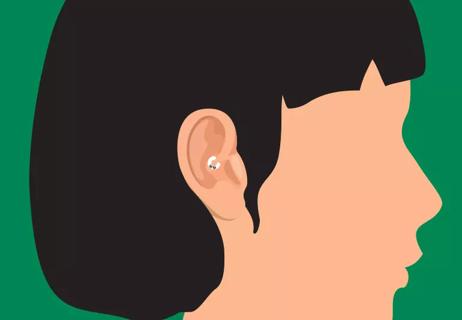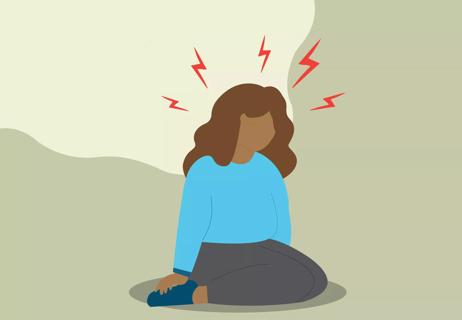Getting enough sleep, avoiding dietary triggers and reducing stress can provide relief

Chronic migraine sufferers know the feeling all too well — that debilitating, hide-in-your-room pain that seems to always hit at the wrong times.
Advertisement
Cleveland Clinic is a non-profit academic medical center. Advertising on our site helps support our mission. We do not endorse non-Cleveland Clinic products or services. Policy
Migraines can be caused by factors like dehydration, certain foods or even changes to barometric pressure or weather. Stress, anxiety or depression can also increase how often these headaches occur.
So, what can you do if you get a migraine?
First and foremost, making lifestyle or behavioral changes can help with migraines. That means exercising more, reducing your screen time and getting proper amounts of sleep. Reducing your stress can also help — or doing things like dimming the lights or using a cold washcloth on your forehead if the pain is too great.
But what works for one person might not work for you, so it’s best to look at your individual lifestyle and migraine frequency and adjust accordingly.
Headache specialist Emad Estemalik, MD, and integrative medicine specialist Melissa Young, MD, explain common migraine remedies and how they may help you lead a migraine-free life.
Whether it’s home remedies for migraines or working with your doctor to find the right medication, Dr. Estemalik and Dr. Young recommend the following:
If you’re searching for natural remedies for migraines, it makes sense to start with how you eat. Eating small, frequent meals keeps your blood sugar stable and helps control migraines.
Advertisement
Try following a mainly Mediterranean diet — one high in fruits, vegetables, beans, lean proteins like free-range chicken and turkey, and healthy fats like wild salmon, nuts and seeds and olive oil.
What you put in your body can have an effect on your migraine headaches.
Some common foods to avoid include:
“Your doctor may recommend an elimination diet to determine if you have delayed food sensitivities, including gluten,” notes Dr. Young.
Water is your best friend — and you should aim to drink the hydrating liquid throughout the day. The National Academies of Science, Engineering and Medicine recommends the following for daily fluid intake:
And when it comes to other beverages like coffee, soda and alcohol, you should proceed with caution — and figure out what amounts work for you.
For some people with migraines, beer and wine, especially red wine, can be a trigger. And in other cases, consuming too much caffeine can also cause a migraine. Anywhere between 100 milligrams and 150 milligrams of caffeine a day — about a cup of coffee — is typically tolerated.
Your healthcare provider should also check for nutritional deficiencies.
“There appears to be a link between the mitochondrial energy production in your cells and migraines,” explains Dr. Young. “Making sure you have the right levels of CoQ-10, vitamin B2 and magnesium, in particular, is helpful in the prevention and treatment of migraine.”
If you take any supplements, it’s important to discuss them with your healthcare provider. They may recommend a 400 milligram (mg) daily riboflavin (vitamin B2) dose, three 100 mg CoQ-10 doses daily to reduce symptoms, or 400 mg to 1,200 mg of a magnesium glycinate daily dose.
Magnesium is also good for reducing migraine auras. Auras are a group of sensory, motor and speech symptoms that usually act like warning signals — think blind spots in your vision, tingling skin or speech changes — that a migraine headache is about to begin.
“A dose of magnesium can protect against these auras, and we often advise patients to take magnesium when they experience their aura,” says Dr. Estemalik.
Herbal remedies for migraines like butterbur and feverfew may also help when dealing with migraines. Butterbur is beneficial for seasonal allergy symptoms, and feverfew — an herb that prevents blood vessel dilation — may help combat migraines, too.
Advertisement
While stress is an inevitable part of life, making lifestyle changes to manage your stress can also decrease the number and severity of your migraines.
“I teach meditation to my patients, including mindfulness and mantra meditation,” shares Dr. Young. “Diaphragmatic breathing and the 4-7-8 breath technique are powerful tools to decrease the impact of stress on the body.”
Chiropractic therapy, acupuncture, massage therapy and biofeedback can also offer migraine relief. If you decide to go this route, be sure to consult with a trained integrative functional medicine physician who can create a personalized treatment plan based on your health history and a physical exam. To get the maximum benefit, find a provider who’s experienced in searching for and identifying the root causes of migraines.
“From my perspective, functional integrative medicine assesses the underlying causes for each individual patient and personalized their treatment,” Dr. Young confirms. “There is often an underlying genetic predisposition for migraines, but when we identify and treat each person’s unique environmental triggers, we see improvements in the severity and frequency of their headaches.”
Struggling to get some quality ZZZs each night? Research shows that sleep disorders like insomnia, teeth grinding and restless legs syndrome can affect the quality and quantity of sleep you get. This can lead to an increased frequency of migraines.
Advertisement
Aim to get the recommended amount of sleep, which is seven to nine hours. Try limiting your screen time before bed and setting up a routine, like going to bed at the same time each night and waking up at the same time each morning.
Taking over-the-counter pain relievers like aspirin, acetaminophen and ibuprofen can aggravate how often you have migraines.
“We usually advise patients to limit the use of any over-the-counter pain relievers to no more than two days a week to avoid rebound or medication overuse headache, which can transform their migraines to chronic migraines,” warns Dr. Estemalik.
We’re not saying to work out when you have a migraine. Instead, focus on exercising on a regular basis — doing so can help lessen migraine symptoms.
That’s thanks to the endorphin, a chemical that helps fight pain, that your body releases during exercise. Whether you want to swim, go for a walk or try yoga, any form of exercise can help.
Your head is pounding. What else can you do? Try applying a cold compress, whether that’s an ice pack or a cold washcloth, to your forehead or wherever you feel pain. Ice helps soothe any throbbing pain you have. For some, using heat may work better when you have a migraine, as it relaxes muscles that may be causing pain.
Advertisement
You can use either method throughout a migraine attack, but don’t leave the cold compress or a heating pad on for more than 15 minutes.
Bright lights (well as loud noises) can trigger a migraine. It can help to seek shelter in a bedroom or area where you can turn off the lights and relax in quiet.
Using blackout curtains throughout your house can help, too. You may also want to wear sunglasses while outside to help block those strong rays. For those who are sensitive to light, known as photophobia, even staring at your phone or computer screen can bring on a migraine. Anti-glare screens can help.
To treat severe migraines, you might need rescue medications that stop a migraine in their tracks after they’ve started or take preventive medicines that keep them at bay.
Prescription medication options include:
“Options can vary from a daily oral preventive medication to monthly migraine injections,” Dr. Estemalik explains, citing botulinum toxin or neuromodulation as two specific examples of successful options. “There’s a whole bunch of new treatments.”
Ready to tackle migraines head-on? The best first step in migraine treatment is a conversation with your healthcare provider.
“Talk to your primary care provider about the frequency and severity of migraines, and if there’s any concern about secondary causes, you might see a headache specialist or a neurologist to determine next steps,” he adds.
Once you settle on the right treatment, keep at it — relief should come soon.
“Usually, if you stick to a good regimen, within a couple of months, you could see a change in headaches frequency,” Dr. Estemalik reassures.

Sign up for our Health Essentials emails for expert guidance on nutrition, fitness, sleep, skin care and more.
Learn more about our editorial process.
Advertisement

Sleep issues and certain foods can lead to an early morning headache

Among the options is a fast-acting medication that offers relief in as little as 15 minutes

Start by reevaluating your triggers and lifestyle factors, but also consider trying new medication

A little can help, too much can hurt

They might look cool, but there’s no scientific evidence that daith piercings ward off pain

Your genes may offer some insight when learning about your migraine symptoms

Migraine length depends on your triggers, health history and whether they are chronic

If you’re experiencing the worst headache of your life, it may be time for a trip to the hospital

Even small moments of time outdoors can help reduce stress, boost mood and restore a sense of calm

A correct prescription helps your eyes see clearly — but as natural changes occur, you may need stronger or different eyeglasses

Both are medical emergencies, but they are very distinct events with different causes